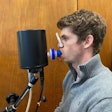
Medical professionals could have a new tool for diagnosing COPD: a simple cotton swab.
Researchers in the department of medicine at Brigham and Women’s Hospital in Boston published a study in JAMA that demonstrated how using a polygenic risk score — which summarizes a person’s genetic risk for COPD — could provide additional clinical help in identifying undiagnosed COPD cases beyond the traditional case-finding approaches.
Study co-author Matthew Moll, MD, MPH, said in a news release that the low-cost genetic samples can be obtained from a cheek swab or a blood test and can be used to create a polygenic risk score for COPD.
“We developed a polygenic risk score for COPD, based on genome-wide association studies of lung function, that was associated with COPD in multiple cohorts,” Dr. Moll said. “We tested the predictive utility of adding this polygenic risk score to a case-finding questionnaire based on demographics, smoking history and symptoms in a population-based, COPD-enriched study.”
The researchers used multiple prediction methods, including area-under-the-curve, net reclassification, precision-recall and net benefit decision curve analysis. The study’s other co-author, Michael Cho, MD, MPH, said the research could help find patients with undiagnosed COPD and overcome some of the barriers to those diagnoses.
“Identifying individuals with undiagnosed COPD and intervening can improve outcomes, but several barriers exist to performing the confirmatory test — i.e., spirometry,” he said. “We demonstrated that genetics could help identify undiagnosed COPD individuals dwelling in the community. With the increasing availability of genetic tests for other diseases, our results highlight the importance of measuring the genetic risk of COPD and that in the future it may be possible to identify undiagnosed individuals using questionnaires and genetics to prioritize who gets spirometry.”























